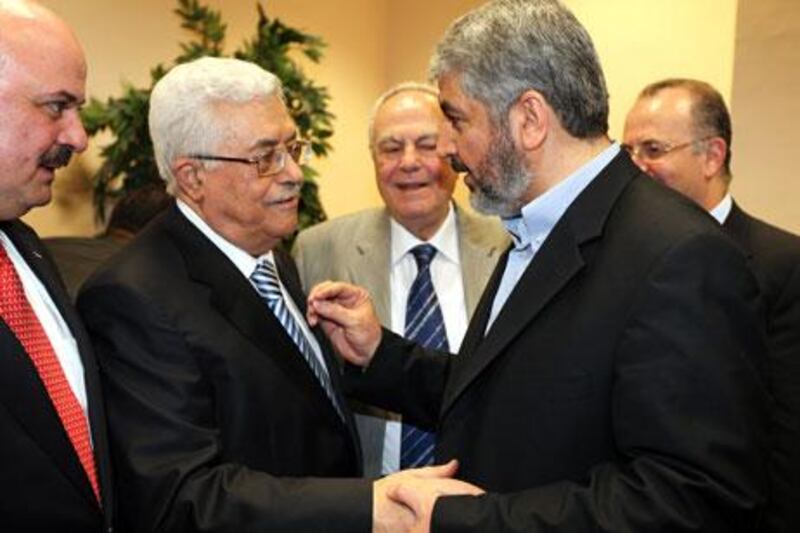JERUSALEM // The differences dividing Hamas and Fatah may have stalled the reconciliation deal they wrote in May. But analysts say it could be their strained relations with their primary benefactors, Tehran and Washington, that ultimately unite them.
Fatah and Hamas both appear to be increasingly at odds with their competing state sponsors as their leaders prepare to meet in Cairo, again, today. That may yield more common ground when Mahmoud Abbas, Fatah's chairman and Palestinian Authority (PA) president, sits next to his Hamas counterpart, Khaled Meshaal.
“This has created circumstances which are much better for reconciliation,” said Talal Okal, a political analyst in Gaza. “It’s forcing both sides to be more conciliatory because they feel they have more to gain from reconciliation.”
In Mr Abbas’s case, he will be rejoining reconciliation efforts after the United States sunk his bid to win statehood recognition from the United Nations.
The Palestinian leader was already chafing under US-brokered Israel-Palestinian peacemaking efforts and their failure for two decades to yield a final deal, and he may now feel less inhibited to follow through on Hamas rapprochement.
“Abbas has reached the end of the road,” said Mr Okal. “He has no alternative but to pursue reconciliation and reunite the Palestinians, because even the negotiations that he promoted for his entire career, the United States, the Quartet, Israel – all have failed him.”
Hamas, too, has grown frustrated with Iran and the strings attached to its financial and, some say, military support.
Their relationship has been seriously undermined by Hamas’s refusal to back a violent crackdown on protesters by the government of Bashar Al Assad, Syria’s president and firm ally of Iran. Tehran has reportedly suspended financial payouts to Hamas as a result.
The Islamist group has instead begun gravitating towards the increasingly assertive Islamist movements emerging from the region’s revolutionary upheaval, primarily Muslim Brotherhood-linked outfits in Tunisia, Libya and especially Egypt.
These Sunni groups have been far more supportive of Palestinian political reconciliation than Tehran and its Shiite leadership ever were, said Mammoun Abu Shahla, a Gaza businessman who has been involved in the reconciliation efforts.
Hamas "are falling under the influence of this new system in the Arab world, which wants Palestinian reconciliation", he said.
Even so, it was far from clear whether these changes would be enough to bring about meaningful change in the Hamas-Fatah relationship.
Fatah and the West Bank's PA leadership would probably suffer crippling suspensions of vital aid from Washington should the two groups strengthen their ties. A continued refusal by Israel to disperse the critical taxes it collects on behalf of the authority also would be likely to continue. The US and Israel consider Hamas a terrorist organisation.
Mr Abbas, too, has apparently demonstrated his willingness to put aside reconciliation for political gain. Analysts suggest he stalled on the accord after its May signing for fear it could generate an international backlash against his statehood bid.
Some also suspect Hamas would be reluctant to relinquish the lucrative enterprises it has carved out in Gaza since taking control of the territory in 2007.
“The split has lasted too long and the vested interests on each side are too big,” said Zakaria Al Qaq, a professor of political science at Al Quds University in Jerusalem.
Dahlia Scheindlin, a Tel Aviv-based political analyst and consultant, said it was unclear if Hamas and Fatah could overcome their different philosophies of challenging Israel.
But both parties appear to have reached a situation where they have all but exhausted options – except reconciliation.
“It’s almost like both of them have played their strongest cards. Fatah had the UN approach and Hamas used its card with Gilad Shalit,” she said, referring to the captured Israeli soldier released by Hamas last month in exchange for about half of the 1,027 Palestinian prisoners in Israeli jails.
If anything, the mutual decline in patron-client relations has raised hopes for both sides to muzzle their notorious bickering.
"For years, Palestinian reconciliation has been encumbered by claims from Fatah that Hamas's leadership is subject to an 'Iranian veto' and from Hamas that Fatah's leadership is subject to an American one," Nathan Thrall, a Middle East analyst with the International Crisis Group, told The New York Times in an article published on Tuesday.
With the “deterioration in relations with their patrons”, he said, that “gives some people hope that factionalism might now be overcome.”
hnaylor@thenational.ae
Follow
The National
on
[ @TheNationalUAE ]
& Hugh Naylor on
[ @HughNaylor ]





